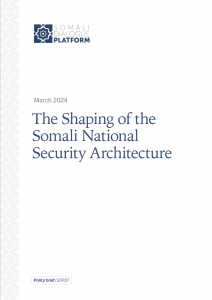Executive summary
This policy paper assesses the revised National Security Architecture (NSArch) in Somalia, pinpointing critical deficiencies and presenting policy recommendations to fortify the national security framework. Central to this analysis are questions surrounding the effectiveness of the NSArch, its reception among Federal Member States (FMSs) and the evolving role of the Macawisley (informal local clan militias; lit. those who wear macawis, a Somali sarong), which play a central role in the fight against al-Shabaab in some Federal Member States (FMSs).
Introduced in May 2017, the NSArch aims to manage the complex security dynamics in Somalia strategically. However, internal discord between former president Mohamed Abdullahi Farmaajo and the FMS overshadowed its implementation. This culminated in the 2017 Kismayo summit when FMS leaders formed a united front against the Federal Government of Somalia (FGS). These political complexities persisted until President Farmaajo’s departure in May 2022. Subsequent leadership under President Hassan Sheikh Mohamud has sought to revitalize the dialogue through the National Consultative Council (NCC), an intra-FGS–FMS platform, leading to the revision of the NSArch.
This briefing is a product of the Somali Dialogue Platform in collaboration with the Somali Public Agenda. The Somali Dialogue Platform is a programme which supports Somalis to achieve consensus on contentious political issues and is implemented by the Rift Valley Institute. The Somali Dialogue Platform is funded by the UK Foreign, Commonwealth and Development Office (FCDO), the Ministry of Foreign Affairs of Denmark, and the United States Agency for International Development (USAID).




